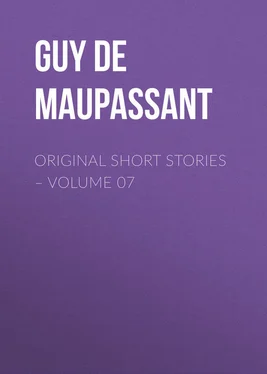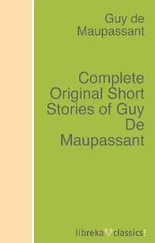Guy Maupassant - Original Short Stories – Volume 07
Здесь есть возможность читать онлайн «Guy Maupassant - Original Short Stories – Volume 07» — ознакомительный отрывок электронной книги совершенно бесплатно, а после прочтения отрывка купить полную версию. В некоторых случаях можно слушать аудио, скачать через торрент в формате fb2 и присутствует краткое содержание. Жанр: literature_19, foreign_antique, foreign_prose, на английском языке. Описание произведения, (предисловие) а так же отзывы посетителей доступны на портале библиотеки ЛибКат.
- Название:Original Short Stories – Volume 07
- Автор:
- Жанр:
- Год:неизвестен
- ISBN:нет данных
- Рейтинг книги:3 / 5. Голосов: 1
-
Избранное:Добавить в избранное
- Отзывы:
-
Ваша оценка:
- 60
- 1
- 2
- 3
- 4
- 5
Original Short Stories – Volume 07: краткое содержание, описание и аннотация
Предлагаем к чтению аннотацию, описание, краткое содержание или предисловие (зависит от того, что написал сам автор книги «Original Short Stories – Volume 07»). Если вы не нашли необходимую информацию о книге — напишите в комментариях, мы постараемся отыскать её.
Original Short Stories – Volume 07 — читать онлайн ознакомительный отрывок
Ниже представлен текст книги, разбитый по страницам. Система сохранения места последней прочитанной страницы, позволяет с удобством читать онлайн бесплатно книгу «Original Short Stories – Volume 07», без необходимости каждый раз заново искать на чём Вы остановились. Поставьте закладку, и сможете в любой момент перейти на страницу, на которой закончили чтение.
Интервал:
Закладка:
“This time the comtesse ordered her daughter to go to bed and never to speak again in this manner, so unbecoming in the mouth of a child toward her mother.
“Yvette’s answer to this was: ‘I give you a month to reflect. If, at the end of that month, we have not changed our way of living, I will kill myself, since there is no other honorable issue left to my life.’
“And she left the room.
“At the end of a month the Comtesse Samoris had resumed her usual entertainments, as though nothing had occurred. One day, under the pretext that she had a bad toothache, Yvette purchased a few drops of chloroform from a neighboring chemist. The next day she purchased more, and every time she went out she managed to procure small doses of the narcotic. She filled a bottle with it.
“One morning she was found in bed, lifeless and already quite cold, with a cotton mask soaked in chloroform over her face.
“Her coffin was covered with flowers, the church was hung in white. There was a large crowd at the funeral ceremony.
“Ah! well, if I had known – but you never can know – I would have married that girl, for she was infernally pretty.”
“And what became of the mother?”
“Oh! she shed a lot of tears over it. She has only begun to receive visits again for the past week.”
“And what explanation is given of the girl’s death?”
“Oh! they pretended that it was an accident caused by a new stove, the mechanism of which got out of order. As a good many such accidents have occurred, the thing seemed probable enough.”
A VENDETTA
The widow of Paolo Saverini lived alone with her son in a poor little house on the outskirts of Bonifacio. The town, built on an outjutting part of the mountain, in places even overhanging the sea, looks across the straits, full of sandbanks, towards the southernmost coast of Sardinia. Beneath it, on the other side and almost surrounding it, is a cleft in the cliff like an immense corridor which serves as a harbor, and along it the little Italian and Sardinian fishing boats come by a circuitous route between precipitous cliffs as far as the first houses, and every two weeks the old, wheezy steamer which makes the trip to Ajaccio.
On the white mountain the houses, massed together, makes an even whiter spot. They look like the nests of wild birds, clinging to this peak, overlooking this terrible passage, where vessels rarely venture. The wind, which blows uninterruptedly, has swept bare the forbidding coast; it drives through the narrow straits and lays waste both sides. The pale streaks of foam, clinging to the black rocks, whose countless peaks rise up out of the water, look like bits of rag floating and drifting on the surface of the sea.
The house of widow Saverini, clinging to the very edge of the precipice, looks out, through its three windows, over this wild and desolate picture.
She lived there alone, with her son Antonia and their dog “Semillante,” a big, thin beast, with a long rough coat, of the sheep-dog breed. The young man took her with him when out hunting.
One night, after some kind of a quarrel, Antoine Saverini was treacherously stabbed by Nicolas Ravolati, who escaped the same evening to Sardinia.
When the old mother received the body of her child, which the neighbors had brought back to her, she did not cry, but she stayed there for a long time motionless, watching him. Then, stretching her wrinkled hand over the body, she promised him a vendetta. She did not wish anybody near her, and she shut herself up beside the body with the dog, which howled continuously, standing at the foot of the bed, her head stretched towards her master and her tail between her legs. She did not move any more than did the mother, who, now leaning over the body with a blank stare, was weeping silently and watching it.
The young man, lying on his back, dressed in his jacket of coarse cloth, torn at the chest, seemed to be asleep. But he had blood all over him; on his shirt, which had been torn off in order to administer the first aid; on his vest, on his trousers, on his face, on his hands. Clots of blood had hardened in his beard and in his hair.
His old mother began to talk to him. At the sound of this voice the dog quieted down.
“Never fear, my boy, my little baby, you shall be avenged. Sleep, sleep; you shall be avenged. Do you hear? It’s your mother’s promise! And she always keeps her word, your mother does, you know she does.”
Slowly she leaned over him, pressing her cold lips to his dead ones.
Then Semillante began to howl again with a long, monotonous, penetrating, horrible howl.
The two of them, the woman and the dog, remained there until morning.
Antoine Saverini was buried the next day and soon his name ceased to be mentioned in Bonifacio.
He had neither brothers nor cousins. No man was there to carry on the vendetta. His mother, the old woman, alone pondered over it.
On the other side of the straits she saw, from morning until night, a little white speck on the coast. It was the little Sardinian village Longosardo, where Corsican criminals take refuge when they are too closely pursued. They compose almost the entire population of this hamlet, opposite their native island, awaiting the time to return, to go back to the “maquis.” She knew that Nicolas Ravolati had sought refuge in this village.
All alone, all day long, seated at her window, she was looking over there and thinking of revenge. How could she do anything without help – she, an invalid and so near death? But she had promised, she had sworn on the body. She could not forget, she could not wait. What could she do? She no longer slept at night; she had neither rest nor peace of mind; she thought persistently. The dog, dozing at her feet, would sometimes lift her head and howl. Since her master’s death she often howled thus, as though she were calling him, as though her beast’s soul, inconsolable too, had also retained a recollection that nothing could wipe out.
One night, as Semillante began to howl, the mother suddenly got hold of an idea, a savage, vindictive, fierce idea. She thought it over until morning. Then, having arisen at daybreak she went to church. She prayed, prostrate on the floor, begging the Lord to help her, to support her, to give to her poor, broken-down body the strength which she needed in order to avenge her son.
She returned home. In her yard she had an old barrel, which acted as a cistern. She turned it over, emptied it, made it fast to the ground with sticks and stones. Then she chained Semillante to this improvised kennel and went into the house.
She walked ceaselessly now, her eyes always fixed on the distant coast of Sardinia. He was over there, the murderer.
All day and all night the dog howled. In the morning the old woman brought her some water in a bowl, but nothing more; no soup, no bread.
Another day went by. Semillante, exhausted, was sleeping. The following day her eyes were shining, her hair on end and she was pulling wildly at her chain.
All this day the old woman gave her nothing to eat. The beast, furious, was barking hoarsely. Another night went by.
Then, at daybreak, Mother Saverini asked a neighbor for some straw. She took the old rags which had formerly been worn by her husband and stuffed them so as to make them look like a human body.
Having planted a stick in the ground, in front of Semillante’s kennel, she tied to it this dummy, which seemed to be standing up. Then she made a head out of some old rags.
The dog, surprised, was watching this straw man, and was quiet, although famished. Then the old woman went to the store and bought a piece of black sausage. When she got home she started a fire in the yard, near the kennel, and cooked the sausage. Semillante, frantic, was jumping about, frothing at the mouth, her eyes fixed on the food, the odor of which went right to her stomach.
Читать дальшеИнтервал:
Закладка:
Похожие книги на «Original Short Stories – Volume 07»
Представляем Вашему вниманию похожие книги на «Original Short Stories – Volume 07» списком для выбора. Мы отобрали схожую по названию и смыслу литературу в надежде предоставить читателям больше вариантов отыскать новые, интересные, ещё непрочитанные произведения.
Обсуждение, отзывы о книге «Original Short Stories – Volume 07» и просто собственные мнения читателей. Оставьте ваши комментарии, напишите, что Вы думаете о произведении, его смысле или главных героях. Укажите что конкретно понравилось, а что нет, и почему Вы так считаете.












